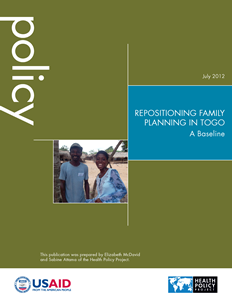The Health Policy Project ended in 2016. Work continued under Health Policy Plus (HP+) until 2022.
PUBLICATION
Author(s): Elizabeth McDavid and Sabine Attama
Primary Language: English
Date: 7/25/2012
Abstract:
Demographic pressures and lack of progress toward the Millennium Development Goals have encouraged countries in West Africa to "take a new look" at repositioning of family planning (RFP)---an initiative established to ensure that FP remains a priority for donors, policymakers, and service providers in sub-Saharan Africa. USAID requested that the Health Policy Project apply the newly developed "Framework for Monitoring and Evaluating Efforts to Reposition Family Planning" in Niger and Togo. The framework results represent a baseline that can subsequently be used to measure progress in RFP by country FP stakeholders. USAID also requested an assessment of policy barriers to community-based distribution of FP---the findings for which are included in this report. Although considerable progress has taken place in Togo in terms of RFP, much remains to be done. Efforts to date appear to have improved acceptance of FP and present opportunities for additional improvement.
To read the results of the application in Niger, view the report and brief, Repositioning Family Planning in Niger: A Baseline.
Applications in six other countries (Benin, Burkina Faso, Guinea, Mali, Mauritania, and Senegal) were later conducted by Futures Group, with funding from the Hewlett Foundation. To access those reports and briefs, visit the Futures Group Publications webpage.
Family Planning/Reproductive Health (FP/RH) Policy Report Repositioning Family Planning West Africa


